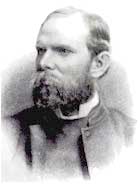Readings:
Ecclesiasticus 3:17-24
Psalm 124
1 Peter 3:14-22
Matthew 10:37-42Preface of Holy Week
[Common of a Martyr]
[Common of a Missionary]
[Common of a Pastor]
[Of the Holy Cross]
[For the Ministry II]
[For the Mission of the Church]
PRAYERS (traditional language)
O God, by whose providence the blood of the martyrs is the seed of the church: Grant that we who remember before thee James Hannington and his companions, may, like them, be steadfast in our faith in Jesus Christ, to whom they gave obedience unto death, and by their sacrifice brought forth a plentiful harvest; through Jesus Christ our Lord, who liveth and reigneth with thee and the Holy Ghost, one God, for ever and ever. Amen.
PRAYERS (contemporary language)
O God, by whose providence the blood of the martyrs is the seed of the church: Grant that we who remember before you James Hannington and his companions, may, like them, be steadfast in our faith in Jesus Christ, to whom they gave obedience even to death, and by their sacrifice brought forth a plentiful harvest; through Jesus Christ our Lord, who lives and reigns with you and the
Holy Spirit, one God, for ever and ever. Amen.
Lessons revised at General Convention 2024.
Return to Lectionary Home Page
Webmaster: Charles Wohlers
Last updated: 1 September 2024
JAMES HANNINGTON AND THE MARTYRS OF UGANDA
(29 OCT 1885)
 Among
the new nations of Africa, Uganda is the most predominantly Christian.
Mission work began there in the 1870's with the favor of King Mutesa,
who died in 1884. However, his son and successor, King Mwanga, opposed
all foreign presence, including the missions.
Among
the new nations of Africa, Uganda is the most predominantly Christian.
Mission work began there in the 1870's with the favor of King Mutesa,
who died in 1884. However, his son and successor, King Mwanga, opposed
all foreign presence, including the missions.
James Hannington, born 1847, was sent out from England in 1884 by the Anglican Church as missionary Bishop of Eastern Equatorial Africa. As he was travelling toward Uganda, he was apprehended by emissaries of King Mwanga. He and his companions were brutally treated and, a week later, 29 October 1885, most of them were put to death. Hannington's last words were: "Go tell your master that I have purchased the road to Uganda with my blood."
The first native martyr was the Roman Catholic Joseph Mkasa Balikuddembe, who was beheaded after having rebuked the king for his debauchery and for the murder of Bishop Hannington. On 3 June 1886, a group of 32 men and boys, 22 Roman Catholic and 10 Anglican, were burned at the stake. Most of them were young pages in Mwanga's household, from their head-man, Charles Lwanga, to the thirteen-year-old Kizito, who went to his death "laughing and chattering." These and many other Ugandan Christians suffered for their faith then and in the next few years.
In 1977, the Anglican Archbishop Janani Luwum and many other Christians suffered death for their faith under the tyrant Idi Amin.
Thanks largely to their common heritage of suffering for their Master, Christians of various communions in Uganda have always been on excellent terms.